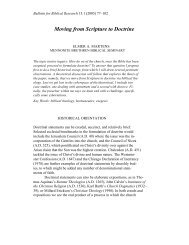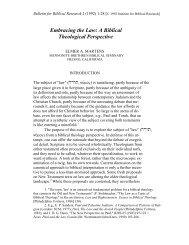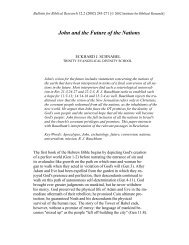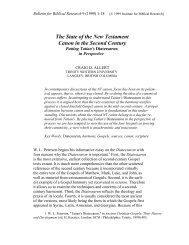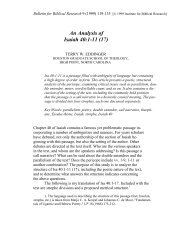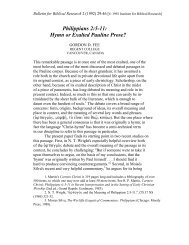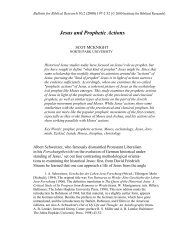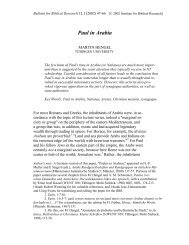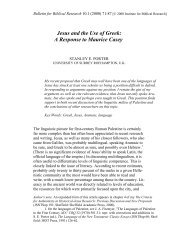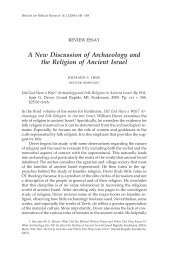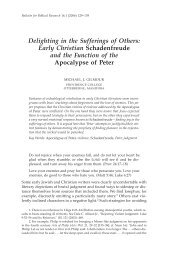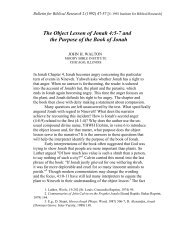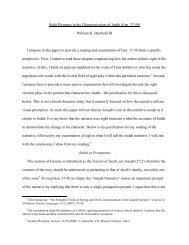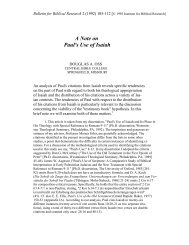The Integrity of the Biblical Canon in Light of Its Historical ...
The Integrity of the Biblical Canon in Light of Its Historical ...
The Integrity of the Biblical Canon in Light of Its Historical ...
You also want an ePaper? Increase the reach of your titles
YUMPU automatically turns print PDFs into web optimized ePapers that Google loves.
MCDONALD: <strong>The</strong> <strong>Integrity</strong> <strong>of</strong> <strong>the</strong> <strong>Biblical</strong> <strong>Canon</strong> 111<br />
hardly lie about <strong>the</strong> extent or antiquity <strong>of</strong> <strong>the</strong> canon; any Roman<br />
reader could <strong>in</strong>quire <strong>of</strong> <strong>the</strong> nearest Jew and test <strong>the</strong> veracity <strong>of</strong> Josephus'<br />
statement." 39 This sounds plausible, but it aga<strong>in</strong> assumes that<br />
"any Jew" would know <strong>the</strong> contents <strong>of</strong> <strong>the</strong> biblical canon or would<br />
even be <strong>in</strong>terested <strong>in</strong> <strong>the</strong> question <strong>of</strong> <strong>the</strong> scope <strong>of</strong> <strong>the</strong> biblical canon. It<br />
also assumes that all Jews everywhere would agree on <strong>the</strong> matter,<br />
which is <strong>the</strong> opposite <strong>of</strong> what we f<strong>in</strong>d <strong>in</strong> <strong>the</strong> rabb<strong>in</strong>ic writ<strong>in</strong>gs—<strong>the</strong><br />
only writ<strong>in</strong>gs that discuss <strong>the</strong> matter. It is precisely this k<strong>in</strong>d <strong>of</strong><br />
<strong>in</strong>quiry that Melito, bishop at Sardis at <strong>the</strong> end <strong>of</strong> <strong>the</strong> second century,<br />
could have made <strong>in</strong> his own community where <strong>the</strong>re was a large<br />
Jewish population if all Jews were sufficiently <strong>in</strong>formed on <strong>the</strong> matter.<br />
On <strong>the</strong> contrary, however, he evidently could not f<strong>in</strong>d sufficient<br />
awareness <strong>of</strong> <strong>the</strong> scope <strong>of</strong> <strong>the</strong> biblical canon <strong>in</strong> his own city, so he made<br />
a special trip to <strong>the</strong> East (to Palest<strong>in</strong>e?) to discover <strong>the</strong> contents <strong>of</strong> <strong>the</strong><br />
Hebrew Scriptures/Christian Bible (Eusebius, Hist. eccl. 4.26.13-14).<br />
If <strong>the</strong> Church had received a closed biblical canon from Jesus, it is odd<br />
that a lead<strong>in</strong>g bishop <strong>of</strong> a large church <strong>in</strong> <strong>the</strong> last third <strong>of</strong> <strong>the</strong> second<br />
century did not know <strong>the</strong> books that made up his Bible. This would be<br />
strange <strong>in</strong>deed if <strong>the</strong> matter had been settled for a long period <strong>in</strong> <strong>the</strong><br />
Church but not so strange if <strong>the</strong> question was still unresolved at <strong>the</strong><br />
end <strong>of</strong> <strong>the</strong> second century. How certa<strong>in</strong> are we that any Roman could<br />
have verified Josephus' comments about <strong>the</strong> extent <strong>of</strong> <strong>the</strong> Hebrew<br />
Bible by ask<strong>in</strong>g "<strong>the</strong> nearest Jew"? If <strong>the</strong> Church had received a closed<br />
biblical canon from Jesus, it is <strong>in</strong>comprehensible why a prom<strong>in</strong>ent<br />
bishop some 150 years later was unable to <strong>in</strong>form his parishioners <strong>of</strong><br />
its contents?<br />
We conclude that <strong>the</strong> OT canon was not complete <strong>in</strong> <strong>the</strong> time <strong>of</strong><br />
Jesus and that <strong>the</strong> only surviv<strong>in</strong>g Judaisms <strong>of</strong> that period, <strong>of</strong> which<br />
<strong>the</strong> Pharisees, Sadducees, Essenes, and early Christians were a part,<br />
do not present to us a unified picture <strong>of</strong> <strong>the</strong> contents <strong>of</strong> <strong>the</strong> biblical<br />
canon. More important than this, however, is <strong>the</strong> obvious fact that if<br />
Jesus presented to his disciples a closed biblical canon that was composed<br />
<strong>of</strong> <strong>the</strong> OT Scriptures <strong>of</strong> <strong>the</strong> current Protestant canon, <strong>the</strong>n <strong>the</strong>y<br />
apparently lost it shortly <strong>the</strong>reafter, s<strong>in</strong>ce <strong>the</strong>y do not restrict <strong>the</strong>mselves<br />
to it even <strong>in</strong> <strong>the</strong> NT writ<strong>in</strong>gs and many <strong>of</strong> <strong>the</strong> church fa<strong>the</strong>rs<br />
recognized o<strong>the</strong>r noncanonical writ<strong>in</strong>gs as Scripture (h( grafh/) <strong>in</strong> <strong>the</strong><br />
second century and follow<strong>in</strong>g. How is it, for example, that Melito, as<br />
reported by Eusebius, <strong>in</strong>cludes Wisdom <strong>of</strong> Solomon <strong>in</strong> his canon <strong>of</strong> OT<br />
Scriptures and omits Es<strong>the</strong>r? And how is it that <strong>the</strong> Jews <strong>of</strong> <strong>the</strong> fourth<br />
and fifth centuries were still debat<strong>in</strong>g <strong>the</strong> contours <strong>of</strong> <strong>the</strong>ir biblical<br />
canon—question<strong>in</strong>g <strong>the</strong> <strong>in</strong>clusion <strong>of</strong> Ecclesiastes, Song <strong>of</strong> Songs,<br />
Proverbs, Es<strong>the</strong>r, and Ruth—if <strong>the</strong> matter had long been settled?<br />
39. Leiman, "Josephus and <strong>the</strong> <strong>Canon</strong>," 54.



